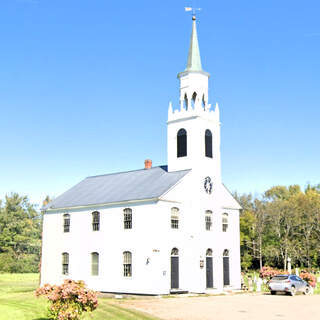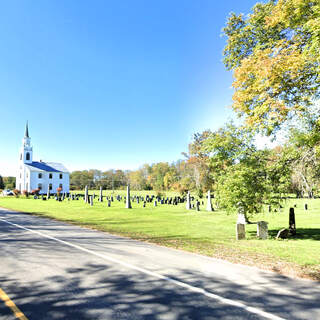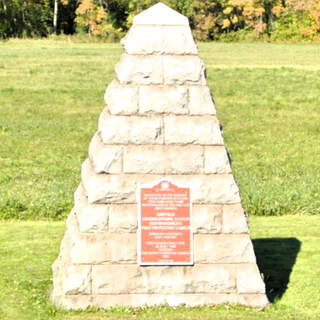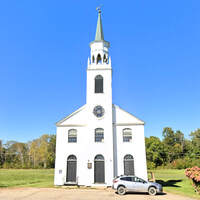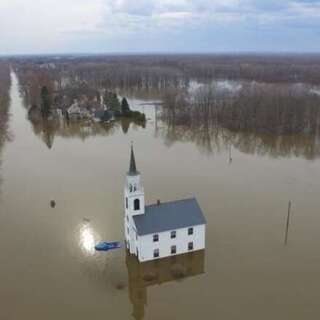We found 5 more United Church of Canada churches near Sheffield
Who we are
Sheffield United Church welcomes Christians and those who seek to connect to Christianity in the Sheffield area.
We aim to make contact with and encourage others to join us in our life-changing Christian journey.
We are a friendly Christian community where we welcome others to join us in our worship and service to God.
Our vision is to make an impact for God, here in Sheffield, New Brunswick by helping people understand the enriching messages of eternal hope given to us by Jesus Christ through His words and deeds.
Everyone is welcome, no matter your age, beliefs, or background. Come just as you are - we'd love to get to know you better.
We aim to make contact with and encourage others to join us in our life-changing Christian journey.
We are a friendly Christian community where we welcome others to join us in our worship and service to God.
Our vision is to make an impact for God, here in Sheffield, New Brunswick by helping people understand the enriching messages of eternal hope given to us by Jesus Christ through His words and deeds.
Everyone is welcome, no matter your age, beliefs, or background. Come just as you are - we'd love to get to know you better.
Church Address
Church Pastor

Mary Tingley
Minister
2169 Route 105
Sheffield,
NB
E3A 8H7
Canada
Download Minister Mary Tingley vCard
Click here to contact Mary Tingley
Denomination
United Church of Canada
United Church of Canada churches in Sheffield, NB
United Church of Canada churches in New Brunswick
United Church of Canada churches in Canada
United Church of Canada churches churches near me
All churches in Sheffield, NB

Affiliations
Church Website
Sheffield United Church on Social Media
Leadership
Leader Name:
Mary Tingley
Leader Position:
Minister
Formal Title:
Leader Address:
Phone:
Fax:
Leader Email:
Click here to contact Mary Tingley
Leader Bio:
Mary Tingley on Social Media:
Other Church Leaders:
Leadership Photos
Add a Photo
Administration
Admin Name:
John Pomeroy
Admin Position:
Secretary
Admin Address:
Phone:
Fax:
Admin Email:
Click here to contact John Pomeroy
Mailing Address
Driving Directions
Travel/Direction Tips
Know how to get there? Share the knowledge with others!
Parking
Please share parking information and/or parking experience!
Sheffield United Church Service Times
This church page is missing service times. Please click here to help this page visitors by submitting the church service times. Thank you!
Worship Languages
Dress Code
Sunday School / Children and Youth Activities
Under 12s:
Under 18s:
Local outreach & community activities
Other activities & ministries
Special Needs/Accessibility
Prayers and Hymns
Main Bible:
Hymns and Songs:
Other information
Average Adult Congregation:
Average Youth Congregation:
Additional Info:
United Church Sheffield Photos
Sheffield United Church History
The Sheffield Congregational Church stands as a testament to the Puritan settlers who migrated from New England to this region in 1762 and 1765, establishing the church. As New Brunswick’s inaugural Protestant Church, it has persisted to this day. Initially constructed in 1775, the church underwent a reconstruction in 1840. In 1925, it became a part of the United Church of Canada.
David Burpee (Burpee)was a farmer, magistrate, and office holder born 1752 in Rowley, Massachusetts. He died May 1845 in Maugerville.
David Burpe must have received his formal education in Massachusetts, for there would have been few opportunities after 1763 when his father joined Israel Perley and others in founding the settlement of Maugerville, in what was then the colony of Nova Scotia.
Also in the group was David’s elderly grandfather Jonathan Burpe, who became first deacon of the Congregational church that was soon organized. In its earliest years Maugerville operated as a traditional New England community, with civil authority vested in town meetings and the church responsible for social discipline.
At age 19, after the death of his parents, David became responsible for his seven surviving brothers and sisters. Active, reticent, cautious, and systematic, he already showed the characteristics of his mature years. While pursuing his farm chores he had trained himself by keeping a diary, which is literate and meticulous, but silent regarding his personal views and ambitions.
An account-book that notes each item he purchased or sold from 1772 to 1784 is an important source for historians in showing how values of goods and services fluctuated during the years of the American revolution in a community where money was scarce and barter common. Historians owe him a further debt for his careful listing of the possessions left by his grandfather in 1781; it provides a rare insight into the style of living of a comparatively well-to-do frontier farmer.
The Burpe family shared the anti-British sentiments of their former compatriots in Massachusetts and David may have played some role in organizing Maugerville’s support of the new Massachusetts government in 1775. Edward Burpe, a younger brother, joined Jonathan Eddy’s expedition against Fort Cumberland (near Sackville, N.B.) the following year. In 1777 a British garrison was placed in Fort Howe (Saint John) and six years later many Maugerville farms were taken over by American loyalists.
Few of the newcomers had cause to respect the feelings of “rebels,” and the old families, in turn, resented the favours granted to the intruders. Disturbed by the changes in their society and inspired by the New Light ideas of Henry Alline, who had held “reformation” services in Maugerville in 1779 and 1781, some of the old inhabitants set themselves apart by withdrawing into a sectarian world of religious fervour. Among them were the followers of Archelaus Hammond, who advocated an antinomianism that led to bizarre forms of worship.
Despite adhering to the conservative beliefs of his grandfather Jonathan, David Burpee maintained an unwavering stance and refused to compromise with the New Lights on matters of theology. Nevertheless, he played a significant role in mitigating the profound divisions within his society and emerged as a moderating influence between the loyalist newcomers and the original residents.
In 1787, both he and Jacob Barker Jr. were appointed as justices of the peace for Sunbury County, which encompassed the townships of Maugerville, now known as the parishes of Maugerville and Sheffield. These appointments bestowed upon them positions of privilege, as the authority was no longer vested in town meetings, as was the case in New England, but rather in the justices who convened in the Court of General Sessions to administer county affairs.
The division within Maugerville township, which occurred in 1786, was further amplified by differences in religious denominations. The parish of Maugerville was predominantly composed of loyalist Anglicans, while the old inhabitants prevailed in Sheffield. When the Church of England in Maugerville laid claim to the public lot where the old New England meeting-house stood, Burpe and Barker took charge in 1789 by orchestrating the relocation of the building several miles downriver to a public lot in Sheffield. They employed a formidable force of 60 teams of oxen to haul it across the ice. During that year, the members of the Congregational Church signed a new covenant.
Although they all hailed from a small number of New England families, their church received support from immigrant Scots and other dissenters, including a handful of loyalists. For reasons unknown, though it is probable that he considered himself unworthy, Burpe did not officially become a church member according to Congregational polity until 1805. Nevertheless, he diligently served as the clerk and participated in all significant committees. The congregation extended an invitation to John James, a Calvinist Methodist from England, to serve as their pastor.
The appointment of John James as the minister of the congregation ended in disaster. In 1792, he faced accusations of drunkenness, associating with individuals of questionable character, and engaging in “scandalous Indecencies” towards a young woman. As a result, James embraced the Church of England. The dissenters managed to regain possession of the parsonage and the meeting-house, which were part of the premises, on August 6, 1793. Burpe, finding the premises temporarily vacant, defiantly entered and challenged the authorities to remove him. The Anglican and dissenting factions had reached an irreparable divide, and the dissenters in Sunbury County became a focal point of opposition against the policies of Lieutenant Governor Thomas Carleton. It was during this time that Burpe likely began his mutually beneficial association with Samuel Denny Street, one of the leading opponents of the administration, second only to James Glenie.
Over the course of three decades until 1830, Burpe served as one of the most active magistrates in his county. He became a justice of the Inferior Court of Common Pleas and diligently carried out various routine tasks, such as examining witnesses, signing recognizances, and binding individuals to keep the peace.
In 1814, he was appointed a justice of the quorum and utilized his position to circumvent the requirement for dissenters to be married by Anglican clergymen, as stipulated by the marriage law. Between January 1815 and September 1835, he performed 124 civil marriage ceremonies in Sheffield. Additionally, Burpe served as the county auditor.
Burpe’s involvement in public affairs stemmed from his unwavering dedication to the religious and social values of 17th-century New England Puritanism. Even in his comparatively youthful years, he became known as “Squire” Burpe, embodying a patriarchal figure committed to revitalizing the dissenters’ church and upholding Calvinist theology and traditional worship practices in the face of the influences of New Light, Methodism, and Baptism.
His efforts bore fruit in 1820 when the Sheffield congregation, reorganized and temporarily in communion with the Church of Scotland, acquired title to a portion of the land designated for the church during the founding of the Maugerville township. Subsequently, they obtained a resident pastor from Scotland on a long-term basis. Later on, the congregation returned to its Congregational identity until it joined the United Church of Canada in 1925.
From: https://mynewbrunswick.ca/sheffield-congregational-church/
David Burpee (Burpee)was a farmer, magistrate, and office holder born 1752 in Rowley, Massachusetts. He died May 1845 in Maugerville.
David Burpe must have received his formal education in Massachusetts, for there would have been few opportunities after 1763 when his father joined Israel Perley and others in founding the settlement of Maugerville, in what was then the colony of Nova Scotia.
Also in the group was David’s elderly grandfather Jonathan Burpe, who became first deacon of the Congregational church that was soon organized. In its earliest years Maugerville operated as a traditional New England community, with civil authority vested in town meetings and the church responsible for social discipline.
At age 19, after the death of his parents, David became responsible for his seven surviving brothers and sisters. Active, reticent, cautious, and systematic, he already showed the characteristics of his mature years. While pursuing his farm chores he had trained himself by keeping a diary, which is literate and meticulous, but silent regarding his personal views and ambitions.
The Burpe family shared the anti-British sentiments of their former compatriots in Massachusetts and David may have played some role in organizing Maugerville’s support of the new Massachusetts government in 1775. Edward Burpe, a younger brother, joined Jonathan Eddy’s expedition against Fort Cumberland (near Sackville, N.B.) the following year. In 1777 a British garrison was placed in Fort Howe (Saint John) and six years later many Maugerville farms were taken over by American loyalists.
Few of the newcomers had cause to respect the feelings of “rebels,” and the old families, in turn, resented the favours granted to the intruders. Disturbed by the changes in their society and inspired by the New Light ideas of Henry Alline, who had held “reformation” services in Maugerville in 1779 and 1781, some of the old inhabitants set themselves apart by withdrawing into a sectarian world of religious fervour. Among them were the followers of Archelaus Hammond, who advocated an antinomianism that led to bizarre forms of worship.
In 1787, both he and Jacob Barker Jr. were appointed as justices of the peace for Sunbury County, which encompassed the townships of Maugerville, now known as the parishes of Maugerville and Sheffield. These appointments bestowed upon them positions of privilege, as the authority was no longer vested in town meetings, as was the case in New England, but rather in the justices who convened in the Court of General Sessions to administer county affairs.
The division within Maugerville township, which occurred in 1786, was further amplified by differences in religious denominations. The parish of Maugerville was predominantly composed of loyalist Anglicans, while the old inhabitants prevailed in Sheffield. When the Church of England in Maugerville laid claim to the public lot where the old New England meeting-house stood, Burpe and Barker took charge in 1789 by orchestrating the relocation of the building several miles downriver to a public lot in Sheffield. They employed a formidable force of 60 teams of oxen to haul it across the ice. During that year, the members of the Congregational Church signed a new covenant.
The appointment of John James as the minister of the congregation ended in disaster. In 1792, he faced accusations of drunkenness, associating with individuals of questionable character, and engaging in “scandalous Indecencies” towards a young woman. As a result, James embraced the Church of England. The dissenters managed to regain possession of the parsonage and the meeting-house, which were part of the premises, on August 6, 1793. Burpe, finding the premises temporarily vacant, defiantly entered and challenged the authorities to remove him. The Anglican and dissenting factions had reached an irreparable divide, and the dissenters in Sunbury County became a focal point of opposition against the policies of Lieutenant Governor Thomas Carleton. It was during this time that Burpe likely began his mutually beneficial association with Samuel Denny Street, one of the leading opponents of the administration, second only to James Glenie.
In 1814, he was appointed a justice of the quorum and utilized his position to circumvent the requirement for dissenters to be married by Anglican clergymen, as stipulated by the marriage law. Between January 1815 and September 1835, he performed 124 civil marriage ceremonies in Sheffield. Additionally, Burpe served as the county auditor.
Burpe’s involvement in public affairs stemmed from his unwavering dedication to the religious and social values of 17th-century New England Puritanism. Even in his comparatively youthful years, he became known as “Squire” Burpe, embodying a patriarchal figure committed to revitalizing the dissenters’ church and upholding Calvinist theology and traditional worship practices in the face of the influences of New Light, Methodism, and Baptism.
His efforts bore fruit in 1820 when the Sheffield congregation, reorganized and temporarily in communion with the Church of Scotland, acquired title to a portion of the land designated for the church during the founding of the Maugerville township. Subsequently, they obtained a resident pastor from Scotland on a long-term basis. Later on, the congregation returned to its Congregational identity until it joined the United Church of Canada in 1925.
Sheffield United Church Historical Photos
2018 flooding - photo courtesy of CBC/Radio-Canada
Show comments
Add a photo
 Abide with us
Abide with us
O Holy Spirit of God, abide with us; inspire all our thoughts; pervade our imaginations; suggest all our decisions; order all our doings. Be with us in our silence and in our speech, in our haste and in our leisure, in company and in solitude, in the freshness of the morning and in the weariness of the evening; and give us grace at all times humbly to rejoice in Thy mysterious companionship.
Sheffield United Church listing was last updated on the 8th of January, 2024
THANK YOU FOR VISITING SHEFFIELD UNITED CHURCH ONLINE!
Sheffield United Church Accelerated Mobile Page (AMP)


